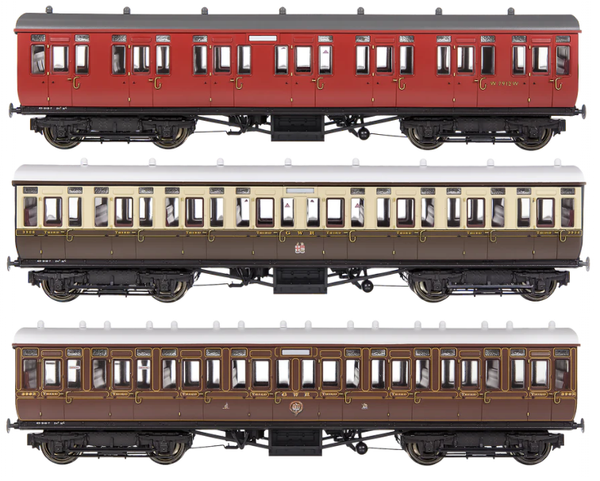Dapol OO Gauge GWR Toplight Mainline City Coaches are now in stock!
Prototype
The first order for these coaches was placed in 1915 but due to the First World War they were not built until 1920. The second batch was completed in 1921. Six sets of coaches were produced with a set comprising six coaches. The coaches were close coupled and constructed with a steel body rather than the traditional wooden paneling. Due to the restrictive loading gauge of the London underground tunnels the carriages are 7 inches lower than other contemporary carriages of the time. This enabled them to travel directly to Aldgate and Liverpool Street, on the Metropolitan Underground system.
The coaches were originally used for commuter traffic from the likes of Reading and Windsor into the City of London. At the start of World War 2 this service was curtailed. However, after the Second World War and into BR days the coaches could be found on services much further afield.
The coaches started to be removed from revenue earning service in December 1956 and all had been removed by December 1957. There was only one significant change made to the design during the lifetime of the coaches which was the removal of one roof ventilator from each compartment.
In 1958 two brake third coaches and one all third coach were converted into workmen’s coaches for the miners service between Glyncorrwg and North Rhondda Halt, this was a former branch line of the South Wales Mineral Railway. The main changes were the addition of an extra window in the end of the guards luggage area and a fitting of a gong to the same end of the coach. This makes coaches 3755, 3756 and 3910 the last three coaches in service. 3755 is fully preserved at Didcot Railway Centre with 3756 being partially restored.
Specification
Dapol has produced an all third, a composite and a third brake coach which will be the perfect companion to the Dapol 61xx Prairie.
General Specification
Highly accurate injection moulded body with bolection window mouldings and frosted Toplight windows.
Separate metal door and commode handles
Wire end hand rails and separately applied end communication details
Correct number of roof ventilators depending on the prototypical period being modelled
Highly detailed chassis with vacuum tanks, battery boxes and brake linkages all to a high degree of fidelity
9ft bogie bolster with diecast side frames and split axles for electrical pick up
Highly detailed interior with period specific decorations being applied
Technical Specification
As well as the impressive selection of aesthetic details the coaches have an impressive technical specification
Kinematic couplings with NEM pockets including special coupling bar to give close coupling
Coaches are capable of negotiating R2 radius curves
Sprung metal buffers
Internal lighting and directional tail lamp
Can be optionally DCC fitted with a six pin decoder such as the Dapol Imperium Five.
Heavy Diecast chassis


 Hornby New Tool TT:120 Class 50s Arrive
Hornby New Tool TT:120 Class 50s Arrive